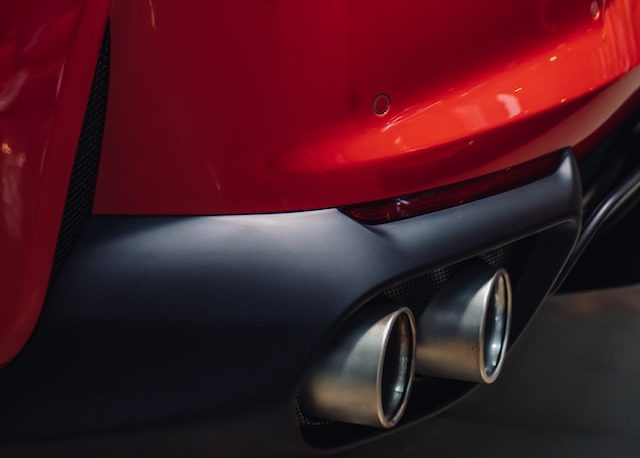
Cargroot is reader-supported. When you buy through links on our site, we may earn an affiliate commission.
Black soot coming from car exhaust is actually very normal. A chemical reaction in the engine causes it; however, it doesn’t necessarily mean your car is broken. If you want to know more about what causes black soot and how it can affect your vehicle, continue reading. You can also check this video to understand why this happens.
What Causes Black Soot?
Black soot is a very common problem. The black substance that comes out of the tailpipe, or muffler as it is commonly called, is actually carbon dust. Car exhaust contains carbon monoxide, which has an odorless and colorless gas. When this gas mixes with hot water, the resulting mixture is known as steam. This steam travels through pipes until it reaches a catalytic converter in the exhaust system.
The catalytic converter uses oxygen from the air to convert carbon monoxide into carbon dioxide and water vapor. These molecules then react with each other and create more steam, which exits through a tailpipe (exhaust pipe). As this steam exits the tailpipe, it releases black soot particles into the air.
What Causes Black Smoke and Soot?
Black smoke and soot in car exhaust are caused by several things. First, your engine needs to burn fuel to get its energy. When you accelerate, that acceleration causes more air to enter your engine’s cylinders, which means it needs more fuel to be burned. This can also cause your engine to overheat if you don’t have enough coolant flowing through it.
Second, the exhaust is burned when the car accelerates because of how much air enters the cylinders when you move faster than usual. It also burns more exhaust when each cylinder has more air coming in than usual because of how much faster you’re moving than when you’re just idling at a stop light or sitting still on the road.
Thirdly, some parts inside your car make black smoke and soot appear on your tailpipe—these are called catalytic converters. Catalytic converters help reduce harmful emissions from vehicles by converting nitrogen oxide emissions into less harmful compounds such as water vapor and carbon dioxide.
Do You Need to Worry About Black Exhaust Smoke?
The answer is – it depends. If you see black exhaust smoke coming out of your car, then it’s a good idea to get it checked out by a professional mechanic. It could be anything from a cracked valve or faulty fuel injector, which would require replacing the part or even the entire engine, to something as simple as an oil leak that needs repair. If you don’t see any smoke from your engine, there’s no need for concern.
In most cases, black exhaust smoke only indicates a problem with one part of the engine that can be easily repaired by replacing that part or parts. However, if the problem persists or worsens over time, it may be time to call a professional mechanic to determine what is going on with your vehicle.
What Causes Soot?
Soot is a dangerous exhaust byproduct that comes from incomplete fuel burning. Here are some of the reasons for soot.
Worn Rings
Worn rings can cause soot in your car’s exhaust. This is because worn-out spark plugs cause carbon buildup inside the combustion chamber and around the gap where the piston meets the cylinder wall. This buildup causes a lot of friction and contributes to soot formation after burning fuel inside an engine.
Leaking Valves
Leaking exhaust valves can cause soot in your car’s exhaust. This can lead to various problems, including increased emissions. Call in a professional to get this checked as soon as it happens.
Improperly Functioning Injectors
One of the first signs your injectors are not functioning correctly is soot in your car’s exhaust. If you notice this happening, you should check your filters. Change your air filter regularly (every 3-4 months) to help reduce dirt buildup on the injectors and prevent it from becoming clogged with other materials such as ash or soot.
EGR System Problems
The EGR system (exhaust gas recirculation) is designed to help keep the exhaust in your vehicle cleaner and less sooty, but sometimes it can cause problems. EGR systems use suction to pull in air and blow out stale air. This makes it easier for your car engine to burn fuel efficiently and create more power without losing too much power. However, if there’s too much unburned fuel in your engine, some of that extra heat will cause soot to be released into the exhaust pipe.
Turbocharger Issue
Turbochargers are used in many cars to increase the engine’s power, and they can sometimes cause problems. This is usually caused by a failure of the turbocharger or a problem with the fuel supply line.
If you notice that you have sooty exhaust, there may be an issue with your car’s turbocharger. The best way to tell if this is the case is by looking at the exhaust after driving it for a while. If there are deposits on the back of your car’s exhaust, it’s time to have the turbochargers checked out.
Takeaway
If you see black soot from your exhaust, you should look for a clogged air cleaner. This is usually caused by a lack of circulation, which can cause the buildup of carbon dust. If this is not the case, check for some of the issues mentioned in this article. Please don’t take this issue lightly, as it can cause lasting damage to your vehicle.



![[Solved] Car Shaking in Reverse – Why & How to Fix It?](https://cargroot.com/wp-content/uploads/2023/03/giorgio-trovato-gBF0CCP_Qy0-unsplash-100x70.jpg)


